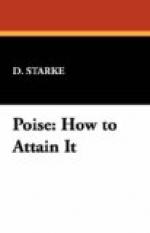To avoid pain, to sit inert, like a gorged animal, without attempting to think, is the sole desire of the gluttons who are wearied by every repeated excess.
The same reasoning could be applied to the lazy, who suffer in health from indulgence in their favorite vice.
It can not be disputed that lack of exercise is the cause of ailments that have a marked effect upon the moral character.
Since physical laziness always goes hand in hand with mental apathy, it follows that a dread of exerting oneself is always to be found coupled with a hatred of being forced to think.
It is, therefore, essential for the man who would acquire poise to fortify himself in advance against physical weaknesses which, by undermining his will-power, will soon furnish him with the most plausible reasons for losing interest in the steady application that is needed for accomplishing his purpose.
In achieving the conquest of poise certain physical exercises, practised every day, and vigorously followed out, will be found of considerable help.
Before discussing the practical methods which are at once their starting-point and their result, we will consider in turn the series of exercises that must be performed each day in order to keep oneself in the condition of physical well-being which allows of the accomplishment of moral reform.
CHAPTER III
FOUR SERIES OF PHYSICAL EXERCISES
FIRST SERIES—BREATHING
The point of departure for the cultivation of poise, like that of everything else in fact, must be a well-ordered system of hygiene, far removed from excess, and insisting only upon the points we have already indicated.
Without wishing to fall into the well-known error of so many modern teachers, who assign an exaggerated importance to breathing exercises, we must, nevertheless, admit the great role that respiration plays in physical balance.
We are now speaking, understand, of methodical breathing, we might almost term it “reasoned” breathing.
Every one, of course, breathes without being aware of it from the moment of his birth to the hour of his death, but very few people are aware how to increase the power and to enlarge the capacity of their lungs.
Nevertheless, upon these conditions it is that activity depends, as well as the health and the energy that enables us to consecrate ourselves to the pursuit of a definite aim.
Without having to lay claim to a vast knowledge of medicine one can discover that all repeated exercise tends to strengthen the organ that is employed.
Thus, well-directed and carefully practised breathing gives the heart a stronger beat and facilitates the action of the lungs.
From these arises a general feeling of physical well-being, which tends to the preservation of good health and stores up the energy we need to carry out our resolves.




